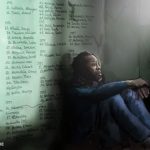Mike Hoare and the South African mercenaries he inspired
The world of mercenaries in South Africa is as sordid as it always was. One man, now dead, had a central role to play in it.
Author:
12 March 2020

The recent death in Durban of former mercenary “Mad” Mike Hoare inspired obituaries in such publications as The New York Times, indicative of his global infamy in the 1960s and 1970s. A relentless self-mythologiser, Hoare led troops in the Democratic Republic of the Congo (DRC), inspired action movies and led a failed coup in the Seychelles.
Hoare presented himself as a swashbuckling, romantic figure from a bygone age of glamorous piracy. The reality of his career was more sordid. During the Cold War, he was part of a global network of virulently anti-communist soldiers of fortune who ran riot across Africa, Latin America and Asia.
Despite proclaiming their love of freedom, in practice they upheld despotic regimes and terrorised civilians – all while enriching themselves. Hoare’s soldiering career had ended by the 1980s, but he paved the way for contemporary South African mercenaries, a persistent presence in the war zones of the 21st century.
A dark history
Hoare was born in India to Irish parents. During World War II, he was a major in the British Royal Armoured Corp and fought against the Japanese Empire in Burma. Later, he immigrated to apartheid South Africa, where he worked in a variety of jobs and raised a family. However, he wanted to apply his military training. This thirst for adventure was combined with reactionary politics. As he told newspapers in the 1960s, “killing communists is like killing vermin, killing African nationalists is as if one is killing an animal.”
Hoare was far from alone in these passions. As soon as World War II ended, the Cold War began. The Chinese revolution, Joseph Stalin’s annexation of Eastern Europe and anti-colonial movements in the Global South were viewed by right-wingers in Nato countries as unitary, existential threats to capitalism and Western supremacy. They also saw political dissent within their home countries, from civil rights movements to anti-war protests, as a subversive fifth column being orchestrated by Moscow.
As the United States and then Soviet Union fought a series of proxy wars across the globe, anti-communist soldiers for hire became involved in a variety of operations, including counter-insurgency against guerrillas and doing covert work such as assassinations, on behalf of governments.
Related article:
As Kyle Burke demonstrates in his exhaustive history, Revolutionaries for the Right: Anticommunist Internationalism and Paramilitary Warfare in the Cold War, these mercenaries described themselves as freedom fighters. This self-portrayal was supported by often uncritical Western media coverage, which depicted macho warriors fighting on the frontlines against crazed and depraved communists. Historical records show a different reality. Mercenaries violently upheld unpopular regimes, suppressed popular demands for democracy and social justice, freely engaged in torture and plunder, and prolonged political conflicts for personal financial gain.
These mercenary companies were stocked with a rogue’s gallery of extreme right-wingers, from soldiers of the white supremacist regimes in South Africa and then Rhodesia to French veterans of the brutal Algerian war. Despite their anti-totalitarian rhetoric, there was a substantial involvement of fascists who had fought for Nazi Germany and the Axis powers. SS Colonel Otto Skorzeny, once a personal favourite of Nazi Party leader Adolf Hitler, established the Paladin Group, which provided training for military juntas in Chile and Greece and consulted with apartheid generals.
Arbitrary force of violence
Hoare became involved in this global conflict through organising a paramilitary company to defend DRC prime minister Moïse Tshombe. Tshombe had been directly involved in the assassination of independence leader Patrice Lumumba and was seen by his opponents as a stooge for foreign mining interests. Hoare, along with other mercenary companies of soldiers from Africa, Europe and US Central Intelligence Agency-trained Cuban exiles were used to crush the Simba Rebellion in the north of the country from 1964 to 1965.
Hoare always maintained that his troops were disciplined professionals, defending civilians, especially European settlers, against barbaric insurgents. Other accounts suggest that mercenaries were more an arbitrary force of violence. As one report from the 1970s noted, “When he was there, his troops were behaved … but he had 600 people under him and when he wasn’t there, they killed a lot of people.”
Burke’s book reports that mercenaries came to be known as the les affreux, the “frightful ones”, who terrorised civilians that opposed Tsombe. Footage from a 1970 British Broadcasting Corporation documentary shows a mercenary with an unmistakably South African accent coldly describing the pleasure he took in torture and admitting that it was fuelled by anti-black racism.
Related article:
After returning from the DRC, Hoare had a successful career as a writer and raconteur, regaling white apartheid audiences with tales of fighting the rooi gevaar, or communist threat. He served as a technical consultant for the 1978 action movie The Wild Geese, which starred Richard Burton as a character based on Hoare. But within a few years, his soldiering career would end in ignominious defeat.
With the clandestine support of the South African government, Hoare embarked on a scheme to overthrow France-Albert René, the socialist president of the Seychelles. This coup d’etat was a farce and badly damaged Hoare’s image as a tactical master.
Posing as tourists from a Johannesburg drinking club, Hoare and his men attempted to smuggle weapons through the airport but were almost immediately caught and had to flee the country after a humiliating firefight. Hoare served a brief prison sentence in South Africa, but was granted amnesty by the apartheid state. He spent the rest of his long life travelling and promoting his image as a “gentleman soldier”.
A murderous legacy
His gun-for-hire legacy has persisted. The fall of the Berlin Wall, and later the endless War on Terror, unleashed a new boom time for private armies and security companies across the globe.
In South Africa, the demise of the apartheid war machine left a host of highly trained soldiers who had gained their battle experience defending white supremacy in Namibia and the townships. Many of them gravitated toward the private military industry, as combatants and consultants, meaning that people who had worked for notorious organs of state terror such as Vlakplaas, Koevoet, 32 “Buffalo” Battalion and the Civil Cooperation Bureau were soon exporting their skill sets abroad.
After the invasion of Iraq, security firms hired armed South Africans in droves, leading Judge Richard Goldstone to decry, “The mercenaries we’re talking about worked for security forces that are synonymous with murder and torture.”
Related article:
One of South Africa’s most prominent military contractors, Eeben Barlow, insists that mercenaries are legitimate security providers who bring stability in conflict zones. But the secretive world of mercenaries seems to incubate adventurism and outright criminality.
South African mercenaries, with the support of former British prime minister Margaret Thatcher’s shiftless son Mark Thatcher, attempted unsuccessfully to seize power in oil-rich Equatorial Guinea. More recently, Paul le Roux, a Zimbabwe-born drugs and arms smuggler hired a mercenary army, including South African hitmen, to run a global criminal empire.
Today’s mercenaries may lack Mad Mike’s flair for drama and self-promotion. But their operations are rooted in the same combination of thrill-seeking, profit-making and dirty politics.
Correction, 13 March 2020: This article previously referred to “decolonial movements” when it should have been “anti-colonial movements”.



